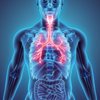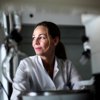-

New findings on the diseases that crushed Napoleon’s army
As if cold, starvation, and typhus weren’t enough. New research reveals that Napoleon’s defeated army also suffered from paratyphoid fever and relapsing fever during the retreat from Russia.
-

Heart Monitoring in Breast Cancer – Essential or Excessive?
Trastuzumab and related drugs have transformed breast cancer treatment and dramatically improved survival rates. But the close cardiac monitoring required during treatment can be a heavy burden for both patients and healthcare systems. Dr. Andri Papakonstantinou is working to refine how doctors identify which patients truly need intensive follow-up.
-

Chalmersforskare: Bättre riskbedömning med lipoprotein än kolesterol
I stället för att mäta kolesterolvärdet i blodet för att förutse risken för hjärtinfarkt kan ett enkelt test av lipoproteinmarkörer ge bättre information. Det har forskare från bland annat Chalmers och Harvard kommit fram till i en studie.
-

Virology professor on the threat from X: ”The next pandemic could be worse“
The question is not if, but when we will be affected by a new unknown virus that causes yet another pandemic. Are we sufficiently prepared? "Absolutely not!", responds virologist Niklas Arnberg.
-

The scientist behind Novo Nordisk's obesity success: “I never stopped believing in GLP-1”
It took several years of failures in GLP-1 before Lotte Bjerre Knudsen and her colleagues found the right path – but when they did, it was a true breakthrough. "We invested for 25 years while everyone else laughed at us. Now everyone wants to join the game," says Lotte Bjerre Knudsen, Chief Scientific Advisor at Novo Nordisk.
-

A tiny animal with great importance
From the mythical Ganges River to the less sacred, but considerably cleaner waters in KI's aquariums in Solna. The little zebrafish has made an unconscious career – as an increasingly important model organism in medical research.
-

Large study: The benefits and risks of obesity medications
Medications such as Ozempic can reduce the risk of a range of different diseases and health conditions but also increase the risk of others. This is according to a large American study where the connections between GLP-1 receptor agonists and the risk of a variety of health outcomes have been examined.
-

The future of healthcare in focus: ”Together, things happen”
In march, it’s once again time for Fokus Patient, an event for the industry where the patients’ perspective takes center stage. It’s a great way to spread knowledge in Sweden and around the world, according to the initiator Penilla Gunther
-

Large study on milk: Risky for women but not for men
The risk of ischemic heart disease (IHD) and acute myocardial infarction (MI) increased for women with milk intake levels higher than 2 glasses per day, while no such association was found in men, according to a new large Swedish study.
-

Jättestudie om mjölk: Riskfyllt för kvinnor men inte för män
Risken för hjärtinfarkt ökade för kvinnor som i genomsnitt drack minst två glas mjölk om dagen, medan det hos män inte återfanns något sådant samband i en ny stor svensk studie.
-

AZ gets approval for drug targeting rare disease – it may reduce cortisone dependence
AstraZeneca’s drug Fasenra gets an expanded indication in the EU and is now approved as a treatment for the rare autoimmune disease known as Churg-Strauss syndrome.
-

Her company is developing a new tablet form obesity drug
Obesity and diabetes are the primary targets of a new tablet treatment under development by Malmö-based Pila Pharma. The company’s ambition is to take on the billion-selling GLP1 analogues. ‘‘Basically, I expect all the beneficial effects that they have, but not the same side effect profile,’’ company founder Dorte X Gram said in an interview with Life Science Sweden.
-

Studie: Hjärtbox gav färre komplikationer än kylväska vid transplantation
En svenskutvecklad metod för att förvara donerade hjärtan inför transplantation minskar risken för patienten att drabbas av tidig hjärtsvikt, enligt en ny studie från bland annat Göteborgs universitet.
-

Innovative start-up helps doctors, scientists and industry balance coagulation risks
For many doctors caring for seriously ill patients, for example, in stroke units and cancer wards, maintaining the life-saving balance between bleeding and thrombosis is an ongoing challenge. In the late 1980s, scientists at Maastricht University in the Netherlands developed an innovative method, the thrombin generation assay (TGA), which provides a complete overview of a physiological process crucial for maintaining normal haemostasis.
-

Beta-blockers are often given unnecessarily, a study finds – “This will affect future practice”
Patients who have suffered a minor heart attack do not benefit from beta-blockers, according to a major new study that may change guidelines for cardiac care.
-

Erfaren medtechledare tar över klubban i Realheart
Medtechbolaget Realheart, som utvecklar ett artificiellt hjärta, har utsett Magnus Öhman till arbetande styrelseordförande.
-

Anna Törner: “My quantified life”
“The expression ‘you can’t see the forest for the trees’ feels newly relevant in the context of wearables. One can easily get caught up in the idea that the more we measure, the more we know,” Anna Törner writes in a column.
-

Ingrid Lönnstedt: Demystification of the power of a scientific study
”You surely do realize that even the smallest changes in study assumptions may influence the estimated sample size needed. And how is it even possible to guess the magnitude of the treatment effect before performing the study?” writes Ingrid Lönnstedt in a column.
-

Anna Törner: The clinical trial – Periscope to reality
What happens to the patients in the clinical trial is not very interesting, writes Anna Törner in a column.
-

Founder of Bioarctic, Lars Lannfelt, is honoured: “I want to create something for the future”
It´s like a scientist’s dream: to be the world’s first with a drug that genuinely affects one of our major diseases. Lars Lannfelt and his company Bioarctic have achieved just that, and they are thus making a significant contribution to the history of Swedish medicine. He is now being awarded the Research!Sweden Award 2023.
-

“You discover one thing – and then 10 new questions arise”
COVID-19, diabetes, heart disease, and the impact of dog ownership on humans are just some of multitasker Tove Fall’s areas of research. However, her current focus is on her next field: the role of gut flora in human health.
-

Lucy Robertshaw: Artificial intelligence – is this really going to transform a patient’s life?
In a column Lucy Robertshaw reflects on how AI and new regulations will affect healthcare, innovation and the lives of future patients.
-

He got inside the head of Sweden’s vaccine hunter
The hunt for the COVID-19 vaccine is the theme of the new book Vaccinjägaren (The Vaccine Hunter). It tells the story of Richard Bergström’s mission as Sweden’s national vaccine coordinator and the scheming that went on behind the scenes in Europe. Author and medical journalist Nils Bergeå co-wrote the book with Richard Bergström.
-

ALS – When the body has given up, but the brain persists
The nerve disease ALS gradually deprives the patient of control over the muscles and, eventually, also of speech. The eyes continue to function, though, and with the help of, among other things, a Swedish-developed invention, communication with the outside world can continue. “It’s their window to the world,” says ALS researcher Caroline Ingre.
Få tillgång till allt innehåll på Life Science Sweden
Ingen bindningstid eller kortinformation krävs
Redan prenumerant? Logga in
Gäller endast personlig prenumeration.
Kontakta oss för en företagslösning.